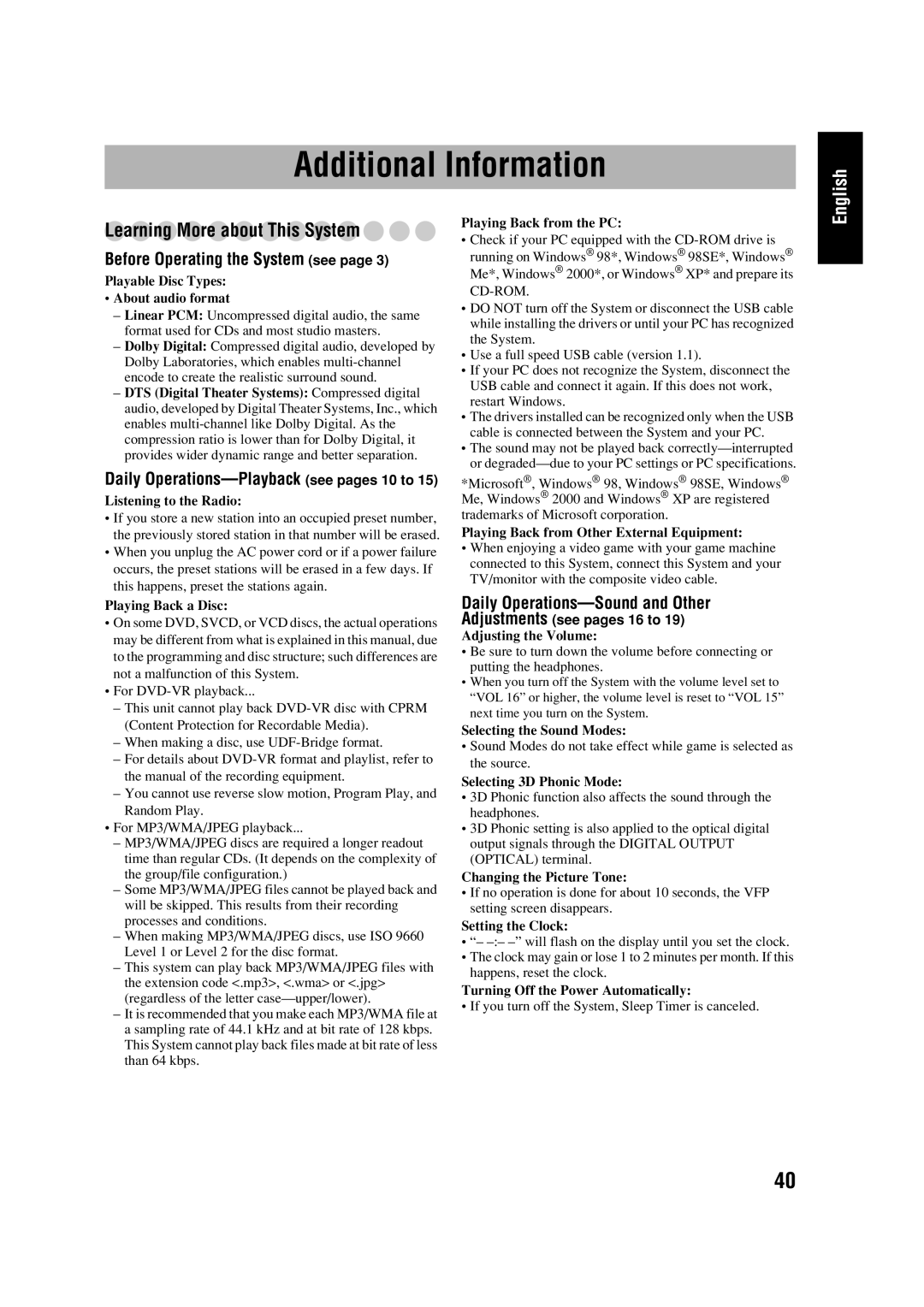
Additional Information
English
Learning More about This System ![]()
![]()
![]()
Before Operating the System (see page 3)
Playable Disc Types:
•About audio format
–Linear PCM: Uncompressed digital audio, the same format used for CDs and most studio masters.
–Dolby Digital: Compressed digital audio, developed by Dolby Laboratories, which enables
–DTS (Digital Theater Systems): Compressed digital audio, developed by Digital Theater Systems, Inc., which enables
Daily Operations—Playback (see pages 10 to 15)
Listening to the Radio:
•If you store a new station into an occupied preset number, the previously stored station in that number will be erased.
•When you unplug the AC power cord or if a power failure occurs, the preset stations will be erased in a few days. If this happens, preset the stations again.
Playing Back a Disc:
•On some DVD, SVCD, or VCD discs, the actual operations may be different from what is explained in this manual, due to the programming and disc structure; such differences are not a malfunction of this System.
•For
–This unit cannot play back
–When making a disc, use
–For details about
–You cannot use reverse slow motion, Program Play, and Random Play.
•For MP3/WMA/JPEG playback...
–MP3/WMA/JPEG discs are required a longer readout time than regular CDs. (It depends on the complexity of the group/file configuration.)
–Some MP3/WMA/JPEG files cannot be played back and will be skipped. This results from their recording processes and conditions.
–When making MP3/WMA/JPEG discs, use ISO 9660 Level 1 or Level 2 for the disc format.
–This system can play back MP3/WMA/JPEG files with the extension code <.mp3>, <.wma> or <.jpg> (regardless of the letter
–It is recommended that you make each MP3/WMA file at a sampling rate of 44.1 kHz and at bit rate of 128 kbps. This System cannot play back files made at bit rate of less than 64 kbps.
Playing Back from the PC:
•Check if your PC equipped with the
•DO NOT turn off the System or disconnect the USB cable while installing the drivers or until your PC has recognized the System.
•Use a full speed USB cable (version 1.1).
•If your PC does not recognize the System, disconnect the USB cable and connect it again. If this does not work, restart Windows.
•The drivers installed can be recognized only when the USB cable is connected between the System and your PC.
•The sound may not be played back
*Microsoft®, Windows® 98, Windows® 98SE, Windows® Me, Windows® 2000 and Windows® XP are registered trademarks of Microsoft corporation.
Playing Back from Other External Equipment:
•When enjoying a video game with your game machine connected to this System, connect this System and your TV/monitor with the composite video cable.
Daily Operations—Sound and Other
Adjustments (see pages 16 to 19)
Adjusting the Volume:
•Be sure to turn down the volume before connecting or putting the headphones.
•When you turn off the System with the volume level set to “VOL 16” or higher, the volume level is reset to “VOL 15” next time you turn on the System.
Selecting the Sound Modes:
•Sound Modes do not take effect while game is selected as the source.
Selecting 3D Phonic Mode:
•3D Phonic function also affects the sound through the headphones.
•3D Phonic setting is also applied to the optical digital output signals through the DIGITAL OUTPUT (OPTICAL) terminal.
Changing the Picture Tone:
•If no operation is done for about 10 seconds, the VFP setting screen disappears.
Setting the Clock:
•“–
•The clock may gain or lose 1 to 2 minutes per month. If this happens, reset the clock.
Turning Off the Power Automatically:
• If you turn off the System, Sleep Timer is canceled.
40
